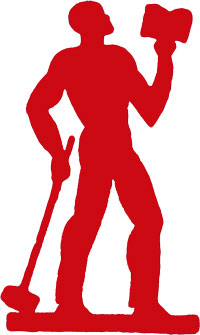first edition
1783 and 1784 · Philadelphia
by [AFRICAN AMERICAN HISTORY & LITERATURE] [SLAVERY & ABOLITION] [PHILLIS WHEATLEY aka PETERS] CRAWFORD, Charles
Philadelphia: Joseph Crukshank, 1783 and 1784. First Edition. First American edition of "The Christian," bound with the first edition of "Observations Upon Negro-Slavery." Both are by Charles Crawford, though the earlier title was issued anonymously. 12mo (16cm). Contemporary sheep; xl,[1]-112; [2]; 24pp. Boards rubbed and worn, especially at joints; rear joint split along upper third but holding. Rear endpaper lacking; faint foxing to contents; still a complete, sound, Good copy. Ownership inscription to front endpaper: "Ann Guest's Book / Philad. Jan 23, 1786 / a present from her friend / Hezekiah Williams."
"Observations," bound in following Crawford's "The Christian" (as seems often to be the case; see note below), includes what is generally considered the first appearance in a book in America by the enslaved poet Phillis Wheatley – a substantial (nearly complete) extract from her poem "To a Clergyman on the Death of His Lady," a poem which had appeared in Wheatley's collection Poems on Various Subjects which had been published in London in 1773, but would not be printed in America until 1787. In this brief abolitionist tract, Crawford presents Wheatley as "...an instance of extraordinary genius. It would be difficult perhaps to name any living person as being endowed with superiour talents for Poetry;" he goes on to quote the testimonials of John Wheatley, Thomas Hutchinson and others regarding the authenticity of Phillis's work, the whole being intended as a counter-argument to what was then a widely-held justification for slavery – that the enslaved natives of Africa were so intellectually inferior to whites that they could not live independently in a (so-called) democratic society.
A survey of Crawford's "The Christian" in OCLC institutions suggests that the majority of copies (16 of 24) were issued with "Negro Slavery" bound-in as after-matter; but the tract was clearly issued separately as well, as OCLC records some 18 stand-alone copies. The availability of institutional copies notwithstanding, this is a rare title that has been seen infrequently in commerce. This could be said to be true of any 18th-century instantiation of Wheatley's work, but this title seems especially elusive: only one copy has appeared at auction in this century (that copy in fact appeared twice, at Swann in 2009 and most recently at Heritage, 2022). Prior to this, one must search back to 1981, for a copy offered by Goodspeed; before that, we find nothing in the auction record after 1922. Earlier non-periodical works by Wheatley were certainly printed in America, even as early as 1770, but they have been generally unobtainable in modern commerce, Charles Heartman having handled a few during the 1930s – making this one of the very few obtainable American appearances of Wheatley printed in her lifetime. With the provenance of two prominent Philadelphia Quaker families, the Guests and the Williamses both recorded in the rolls of the Philadelphia monthly and weekly meetings. This work not noted in Heartman. LCP AFRO-AMERICANA 2793; DUMOND (Anti-Slavery) p.45. EVANS 17893 & 18425. (Inventory #: 80706)
"Observations," bound in following Crawford's "The Christian" (as seems often to be the case; see note below), includes what is generally considered the first appearance in a book in America by the enslaved poet Phillis Wheatley – a substantial (nearly complete) extract from her poem "To a Clergyman on the Death of His Lady," a poem which had appeared in Wheatley's collection Poems on Various Subjects which had been published in London in 1773, but would not be printed in America until 1787. In this brief abolitionist tract, Crawford presents Wheatley as "...an instance of extraordinary genius. It would be difficult perhaps to name any living person as being endowed with superiour talents for Poetry;" he goes on to quote the testimonials of John Wheatley, Thomas Hutchinson and others regarding the authenticity of Phillis's work, the whole being intended as a counter-argument to what was then a widely-held justification for slavery – that the enslaved natives of Africa were so intellectually inferior to whites that they could not live independently in a (so-called) democratic society.
A survey of Crawford's "The Christian" in OCLC institutions suggests that the majority of copies (16 of 24) were issued with "Negro Slavery" bound-in as after-matter; but the tract was clearly issued separately as well, as OCLC records some 18 stand-alone copies. The availability of institutional copies notwithstanding, this is a rare title that has been seen infrequently in commerce. This could be said to be true of any 18th-century instantiation of Wheatley's work, but this title seems especially elusive: only one copy has appeared at auction in this century (that copy in fact appeared twice, at Swann in 2009 and most recently at Heritage, 2022). Prior to this, one must search back to 1981, for a copy offered by Goodspeed; before that, we find nothing in the auction record after 1922. Earlier non-periodical works by Wheatley were certainly printed in America, even as early as 1770, but they have been generally unobtainable in modern commerce, Charles Heartman having handled a few during the 1930s – making this one of the very few obtainable American appearances of Wheatley printed in her lifetime. With the provenance of two prominent Philadelphia Quaker families, the Guests and the Williamses both recorded in the rolls of the Philadelphia monthly and weekly meetings. This work not noted in Heartman. LCP AFRO-AMERICANA 2793; DUMOND (Anti-Slavery) p.45. EVANS 17893 & 18425. (Inventory #: 80706)





![Peekskill: USA. A Personal Experience [Signed by Fast, Robeson, and Patterson]](https://d3525k1ryd2155.cloudfront.net/h/082/203/1656203082.0.m.jpg)
![Warriors Don't Cry: A Searing Memoir of the Battle to Integrate Little Rock's Central High [Inscribed]](https://d3525k1ryd2155.cloudfront.net/h/015/203/1656203015.0.m.jpg)